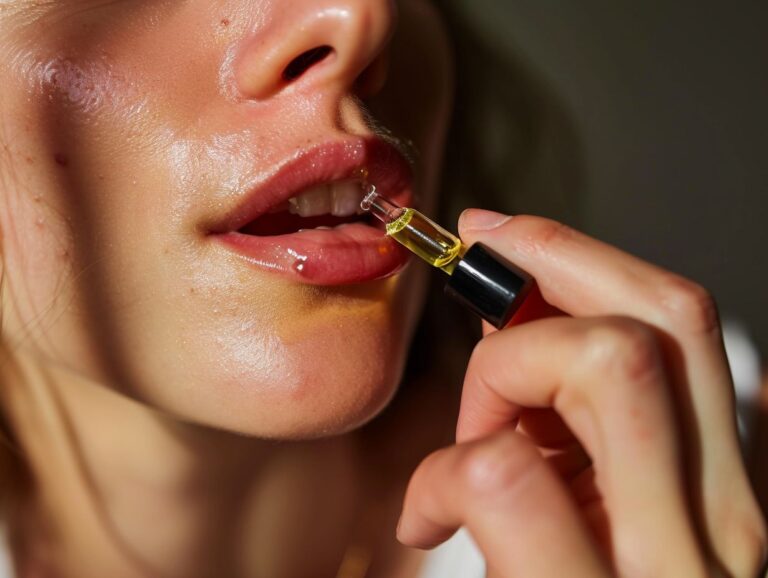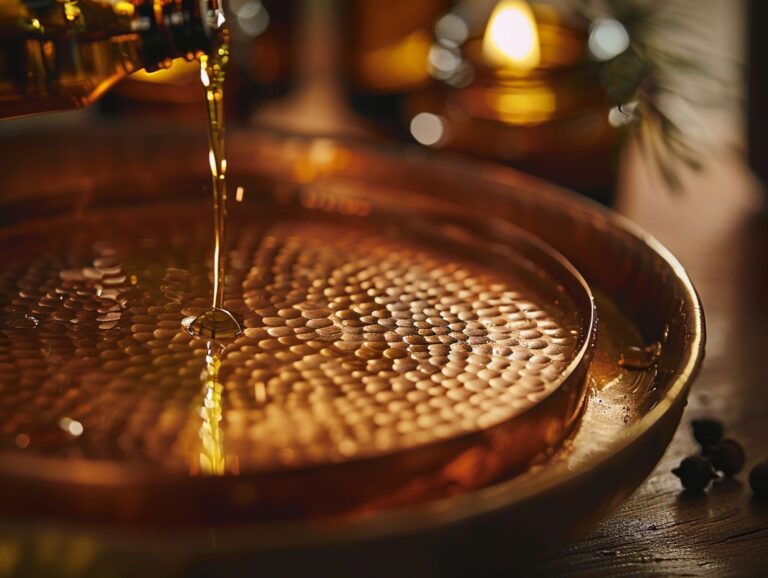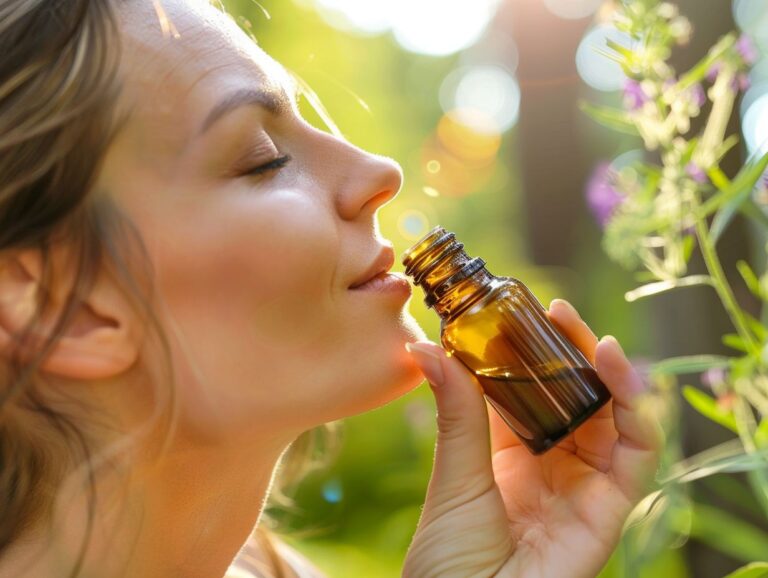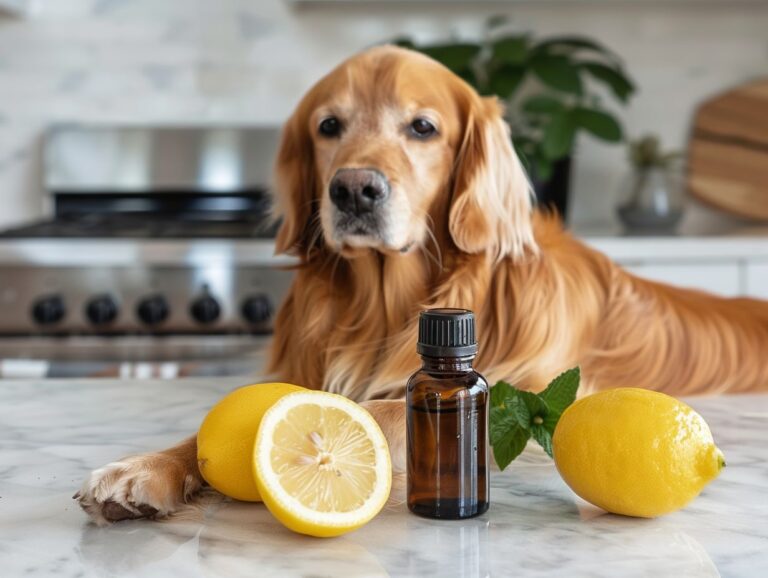Why Dilute Essential Oils
Essential oils have gained popularity for their numerous benefits, including aromatherapy, natural cleaning, and skin/hair care. Dilution is essential for safety and effectiveness.
We will explore the reasons for diluting essential oils, the best methods to do so, and the top essential oils that should be diluted.
Learn how to use diluted essential oils through topical application, inhalation, and diffusion. Discover the wonders of diluted essential oils!
Key Takeaways:
What Are Essential Oils?
Essential oils are natural, highly concentrated plant extracts that capture the aromatic essence of a plant. They are commonly used in aromatherapy for their therapeutic properties.
These oils are extracted through various methods such as steam distillation, cold pressing, or solvent extraction. The process usually involves carefully collecting the volatile compounds from flowers, leaves, stems, roots, or other parts of the plant.
Essential oils have been used for centuries in traditional medicine due to their potential benefits for physical and emotional well-being. Aromatherapy, the practice of using these oils for healing purposes, taps into the power of scent to promote relaxation, improve sleep, reduce stress, and even enhance cognitive function.
What Are the Benefits of Essential Oils?
The benefits of essential oils are vast, ranging from promoting skin health to creating aromatic blends for various applications. These oils are well-known for their soothing properties and versatility.
Essential oils can help improve skin health by reducing blemishes, hydrating dry skin, and providing a natural glow. Their antibacterial and anti-inflammatory properties make them ideal for treating acne and other skin conditions.
Essential oils have a profound impact on emotional well-being, promoting relaxation, reducing stress and anxiety, and uplifting mood. They can be used in diffusers, massage oils, or baths to create a calming atmosphere.
Along with skincare and emotional benefits, essential oils are widely used in personal care products such as lotions, soaps, and shampoos. Their fragrances add a refreshing touch and their properties enhance the efficacy of these products.
Aromatherapy
Aromatherapy is a holistic healing treatment that uses natural plant extracts to promote health and well-being. Individuals may have varying sensitivities to different aromas, thus the importance of proper blending techniques and concentration levels for potency.
It is essential in aromatherapy to consider the individual’s unique response to scents. Essential oils, extracted from plants, flowers, and herbs, form the core of this practice. The oils can be inhaled, applied topically, or used in massage oils or diffusers to harness their therapeutic benefits. Blending different oils requires a delicate balance to create synergistic effects. Attention to the concentration levels is crucial to ensure both safety and efficacy in the treatment process.
Natural Cleaning Products
Essential oils are commonly used in natural cleaning products due to their antibacterial and antifungal properties. It is important to be aware of potential skin reactions and safety precautions, especially for individuals with specific health conditions.
When using essential oils for cleaning, take note of dilution ratios to prevent skin irritation. For those with asthma or allergies, it is advised to test a small patch of skin before extensive use. Pregnant individuals should consult a healthcare provider before incorporating certain oils. Proper ventilation while using essential oils is crucial, particularly in small, enclosed spaces. Always store oils out of reach of children and pets, ensuring proper labeling and secure caps to avoid accidental ingestion.
Skin and Hair Care
Essential oils are popular in skin and hair care for their nourishing and therapeutic benefits. Proper dilution with carrier oils is essential to avoid skin irritation and adverse reactions, especially when used topically or in massage.
Carrier oils play a crucial role in enhancing the efficacy of essential oils for skincare by ensuring they are distributed evenly and absorbed properly into the skin. When diluted correctly, essential oils can address various skin concerns like acne, dryness, and inflammation.
- In hair care, essential oils are known to promote hair growth, reduce dandruff, and add shine to dull hair.
- The aromatherapy benefits of essential oils can have a calming effect on the mind, helping to reduce stress and anxiety.
Why Dilute Essential Oils?
Diluting essential oils is crucial to ensure safety and reduce the risk of skin irritation, especially for individuals with sensitive skin. High concentration levels can lead to adverse reactions.
When using essential oils in their concentrated form, there is a higher likelihood of skin sensitivity and irritation, which can vary from person to person. Dilution not only helps in preventing skin reactions but also aids in proper absorption and effectiveness of the oil. It is recommended to dilute essential oils with a carrier oil like jojoba, coconut, or almond oil to reduce the potency while still benefiting from their therapeutic properties.
Safety Precautions

For children, it is recommended to use lower dilution rates compared to adults, typically ranging from 0.25% to 1%.
Essential oils are highly concentrated, and undiluted use can lead to skin irritation, rashes, or even adverse reactions.
When working with infants or toddlers, it is best to consult with a healthcare professional beforehand. Elderly individuals with delicate skin may benefit from even lower dilution rates, usually around 0.5% to 2%. It is crucial to conduct a patch test before using any new essential oil, especially for those with sensitive skin.
Avoid Skin Irritation
Skin irritation can occur when essential oils are applied without proper dilution or carrier oils. Understanding the correct dilution rates and choosing suitable carrier oils can help avoid adverse skin reactions.
Carrier oils play a crucial role in diluting essential oils before applying them to the skin. They help reduce the risk of irritation by acting as a base that slows down the absorption rate of the potent essential oils. Some popular carrier oils include sweet almond oil, jojoba oil, coconut oil, and grapeseed oil. These carrier oils are known for their soothing properties and are generally well-tolerated by most skin types. By combining essential oils with these gentle carrier oils, you can create a safe and effective blend for topical application.
Increase Absorption
Proper dilution of essential oils can enhance their absorption into the skin, allowing for better efficacy of the oil’s therapeutic properties. Topical application with the correct dilution rate ensures optimal absorption.
When essential oils are not diluted properly before being applied to the skin, there is a risk of skin irritation, sensitization, or adverse reactions. Diluting essential oils appropriately enables them to spread more evenly over the skin surface, helping the active compounds penetrate deeper into the skin layers. This deeper penetration enhances the oil’s ability to work effectively on various skin concerns.
Diluting essential oils can also extend their usage and increase the longevity of a bottle, making the oil more cost-effective in the long run. Correct dilution rates are essential to ensure that the potent properties of essential oils are harnessed optimally without causing any harmful effects.
How to Dilute Essential Oils?
Diluting essential oils can be done using carrier oils, water, or other dilution methods to achieve safe and effective application. Understanding the appropriate dilution rates and methods is essential for optimal results.
Regarding diluting essential oils, using carrier oils such as coconut, jojoba, or almond oil is a popular choice as they help disperse the concentrated oils and minimize skin sensitivity. Choosing the right carrier oil is crucial, considering their own therapeutic properties that can complement the essential oil being used.
Water dilution is another method, though less common due to the hydrophobic nature of essential oils. For certain applications like room sprays or mists, water can be a suitable diluent.
Remember, the dilution ratio varies depending on the age, health, and intended use, so always refer to reliable sources for guidance.
Carrier Oils
Carrier oils are commonly used to dilute essential oils for safe topical application. Understanding the properties of different carrier oils and their dilution rates is essential for creating effective blends.
Choosing the right carrier oil is crucial as each oil possesses unique healing properties that can enhance the benefits of the essential oils being used. For example, coconut oil is well-known for its moisturizing and nourishing qualities, making it ideal for skincare products. On the other hand, jojoba oil closely resembles the natural oils produced by the skin, making it great for facial serums. It’s important to note that almond oil is gentle and suitable for sensitive skin, while olive oil is rich in antioxidants and can aid in fighting free radicals.
Water
Water can be used to dilute essential oils for certain applications, especially when creating sprays or mists. Understanding the correct dilution rates and methods for using water as a diluent is important.
When diluting essential oils with water for sprays or mists, it’s crucial to consider the water-to-oil ratio. A common dilution ratio is 1:1, meaning one part water to one part essential oil. This ratio helps ensure proper dispersion and safety. For sensitive skin or particular oils, you may opt for a 1:2 ratio, with more water than oil.
- Start by selecting a fine mist spray bottle to achieve a consistent application.
- Measure the water and essential oil carefully to maintain the desired ratio.
- Shake the spray bottle well before each use to evenly distribute the oil and water.
Incorporating water as a dilution method can enhance the versatility of essential oils in your daily routines.
Other Dilution Methods
There are various other dilution methods for essential oils, including using creams, lotions, or diffusers. Each method requires specific dilution rates to maintain the potency and effectiveness of the oils.
When opting for creams as a dilution method, it’s essential to consider the consistency of the base cream; thicker creams may require higher dilution ratios to ensure proper dispersion of the essential oils. Lotions, being lighter in texture, typically necessitate lower dilution rates for effective blending.
Utilizing diffusers is another popular way to disperse essential oils into the air for aromatherapy purposes. It’s crucial to follow manufacturer guidelines on the amount of oil to use to prevent overwhelming scents or potential irritations.
What Are the Best Essential Oils to Dilute?

-
Peppermint oil is known for its cooling and invigorating properties, making it great for promoting focus and relieving headaches.
-
Lavender oil is prized for its calming effects, ideal for relaxation and promoting better sleep.
-
Tea Tree oil is renowned for its antimicrobial properties, perfect for treating skin conditions and boosting immunity.
-
Eucalyptus oil is excellent for respiratory health and clearing congestion, offering a refreshing and revitalizing scent.
-
Lemon oil is uplifting and energizing, perfect for enhancing mood and purifying the air.
Peppermint Oil
Peppermint oil is a versatile essential oil known for its cooling sensation and digestive benefits. Diluting it properly before topical application ensures safe use on the skin.
When using Peppermint oil for skin care, dilution is crucial to prevent any irritation or sensitivity, especially for individuals with sensitive skin. By diluting it with a carrier oil such as coconut or almond oil, you can enjoy the refreshing benefits of Peppermint oil without any adverse reactions.
Peppermint oil’s soothing properties make it a popular choice for topical treatments such as relieving muscle tension, headaches, and itchiness. Diluting it properly also helps in extending its use and benefits, making it a cost-effective option for various skin and health concerns.
Lavender Oil
Lavender oil is a popular choice for relaxation and stress relief. Diluting Lavender oil allows for gentle application and blending with other oils for enhanced benefits.
When using Lavender oil in its pure form, it is recommended to dilute it with a carrier oil like sweet almond or jojoba oil. This helps to prevent skin irritation and ensures the oil is applied in a safe manner. The soothing properties of Lavender oil make it a versatile option for creating calming blends.
Lavender oil’s calming effects can be combined with oils such as Bergamot, Chamomile, or Frankincense to promote relaxation and reduce feelings of stress. Experimenting with different combinations can help find the perfect blend to suit individual preferences and needs for relaxation and stress relief.
Tea Tree Oil
Tea Tree oil is renowned for its antibacterial properties, especially in treating acne and skin blemishes. Proper dilution ensures effective and safe application on the skin.
When using Tea Tree oil for acne treatment, it is important to dilute it properly to avoid any skin irritation. A general rule of thumb is to mix one part Tea Tree oil with nine parts carrier oil, such as jojoba or coconut oil, before applying it to the skin. This dilution ratio helps to maintain the efficacy of the oil while minimizing the risk of adverse reactions.
The antibacterial and anti-inflammatory properties of Tea Tree oil make it a popular choice for combating various skin conditions, including acne, eczema, and psoriasis. Its ability to unclog pores and reduce inflammation can help improve the overall appearance and health of the skin.
Eucalyptus Oil
Eucalyptus oil is commonly used for respiratory support and relieving congestion. Diluting Eucalyptus oil before inhalation or topical application ensures safe and efficient use.
Respiratory benefits: The inhalation of Eucalyptus oil can help clear nasal passages, reduce coughing, and promote easier breathing. This oil is known for its decongestant properties, making it a popular choice during colds, flu, or sinus infections. To experience these benefits, you can add a few drops of Eucalyptus oil to a bowl of hot water, cover your head with a towel, and inhale the steam. Make sure to keep your eyes closed during inhalation to avoid irritation.
Dilution recommendations: When applying Eucalyptus oil topically, it’s crucial to dilute it with a carrier oil to prevent skin irritation. A safe dilution ratio is typically 2-3 drops of Eucalyptus oil per teaspoon of carrier oil. Common carrier oils include coconut oil, almond oil, or jojoba oil. Always perform a patch test before widespread application to check for any allergic reactions.
Lemon Oil
Lemon oil is known for its cleansing properties and uplifting citrus scent. Diluting Lemon oil allows for safe use in cleaning products and aromatherapy blends.
When using Lemon oil for cleaning, it can effectively cut through grease and grime, leaving behind a fresh and invigorating aroma. To create a natural all-purpose cleaner, simply mix a few drops of Lemon oil with water and white vinegar in a spray bottle. This solution can be used on countertops, floors, and glass surfaces.
For mood enhancement, diffuse Lemon oil in a diffuser to create a cheerful atmosphere in your home or workspace. Its bright scent can help uplift spirits and promote a positive mindset.
When blending Lemon oil with other essential oils, it pairs well with Lavender for a calming blend, or Peppermint for a refreshing and energizing combination.
How to Use Diluted Essential Oils?
Diluted essential oils can be used through topical application, massage, and inhalation for various therapeutic benefits. Understanding the different methods of application is key to maximizing the effects of the oils.
When using diluted essential oils topically, it’s important to remember that these concentrated plant extracts should never be applied directly to the skin. For safe application, always dilute them with a carrier oil, such as coconut or jojoba oil, to reduce the risk of skin irritation. Before applying the diluted essential oil, it’s advisable to perform a patch test on a small area of skin to check for any sensitivities.
In massage treatments, diluted essential oils can enhance the overall experience by promoting relaxation, easing muscle tension, and improving circulation. By blending a few drops of essential oil with a carrier oil, you can create a customized massage oil suitable for your specific needs.
Inhalation of diluted essential oils can have a direct impact on the respiratory system, helping to alleviate congestion, improve breathing, and enhance overall well-being. Methods of inhalation include using a diffuser, inhaling from the palms of your hands, or adding a few drops to a bowl of steaming water for a soothing steam inhalation.
Topical Application

When applying diluted essential oils topically, it’s important to consider the varying skin absorption rates of different oils. Some oils may penetrate the skin more quickly than others, influencing the speed and intensity of their effects.
For skin health, essential oils like lavender and tea tree can be diluted and applied to help with blemishes, scars, or eczema. For pain relief, oils such as peppermint or eucalyptus can be diluted and massaged onto sore muscles for a soothing sensation.
Using essential oils topically in aromatherapy practices, like applying a diluted blend to the wrists or temples, can help promote relaxation and emotional balance. Remember, always perform a patch test and consult with a qualified aromatherapist or healthcare practitioner for personalized guidance.”
Inhalation
Inhalation of diluted essential oils involves breathing in the aromatic vapors for respiratory and emotional benefits. Sensitivity to aromas and the inhalation method used can impact the effectiveness of the oils.
Essential oils have the ability to influence mood and overall well-being through their powerful aromas. When inhaled, these natural compounds can trigger responses in the brain that promote relaxation, focus, or even uplift the spirit. It’s important to dilute essential oils properly before inhalation to prevent skin sensitivities or adverse reactions. Different methods such as steam inhalation, diffusers, or direct palms inhalation offer varying degrees of effectiveness in delivering the therapeutic benefits of the oils to the body.
Diffusion
Diffusion of diluted essential oils disperses the aroma throughout a space for therapeutic and aromatic benefits. Choosing suitable blends and diffusion methods can create a relaxing or invigorating atmosphere.
When selecting blends for aromatherapy, it’s important to consider the desired effects. Calming scents like lavender and chamomile are perfect for unwinding after a long day, while citrusy blends such as lemon and orange can uplift the mood. Experimenting with different combinations allows you to customize the ambiance to suit your preferences.
There are various diffusion techniques to disperse the oils effectively. Ultrasonic diffusers use water to create a fine mist, while nebulizing diffusers break down the oil particles for a more potent aroma. Reed diffusers, on the other hand, offer a passive way to scent a room over time.
Frequently Asked Questions
Why Dilute Essential Oils?
There are several reasons why diluting essential oils is recommended:
- It helps to reduce the potency of the oil, making it safer and gentler to use.
- It allows for a larger surface area of the oil to be applied, increasing its effectiveness.
- Diluting can prevent skin irritation or sensitization, especially for those with sensitive skin.
- It helps to extend the shelf life of the oil by reducing oxidation.
- Dilution allows for better control and measurement of the amount of oil being used.
- Lastly, diluting essential oils can save you money in the long run by stretching out the use of the oil.
How do I Dilute Essential Oils?
The most common way to dilute essential oils is by using a carrier oil, such as jojoba, almond, or coconut oil. A good rule of thumb is to use a 2% dilution rate, which means adding 12 drops of essential oil to 1 ounce of carrier oil. This can be adjusted depending on the sensitivity of your skin and the potency of the oil.
Can I Dilute Essential Oils with Water?
No, essential oils and water do not mix well together. In fact, adding water to essential oils can cause them to separate or even potentially cause irritation or burns on the skin. Always use a carrier oil or other recommended dilution method when using essential oils.
Are There any Essential Oils That Shouldn’t be Diluted?
Yes, there are some essential oils that are safe to use without dilution. These include lavender, tea tree, and chamomile. However, it is always best to do a patch test on a small area of skin before applying any essential oil directly to the skin. If you experience any irritation, diluting the oil is recommended.
What Should I Do if I Experience Skin Irritation after Using an Essential Oil?
If you experience any skin irritation after using an essential oil, stop using it immediately. You can apply a carrier oil to the affected area to help soothe the irritation. If the irritation persists or becomes severe, seek medical attention.
Are There Any Other Reasons to Dilute Essential Oils?
In addition to the reasons listed above, diluting essential oils can also help to spread the scent of the oil further. This can be beneficial for aromatherapy purposes, as well as creating a more subtle and pleasant scent when using essential oils for cleaning or other purposes.








2 Comments